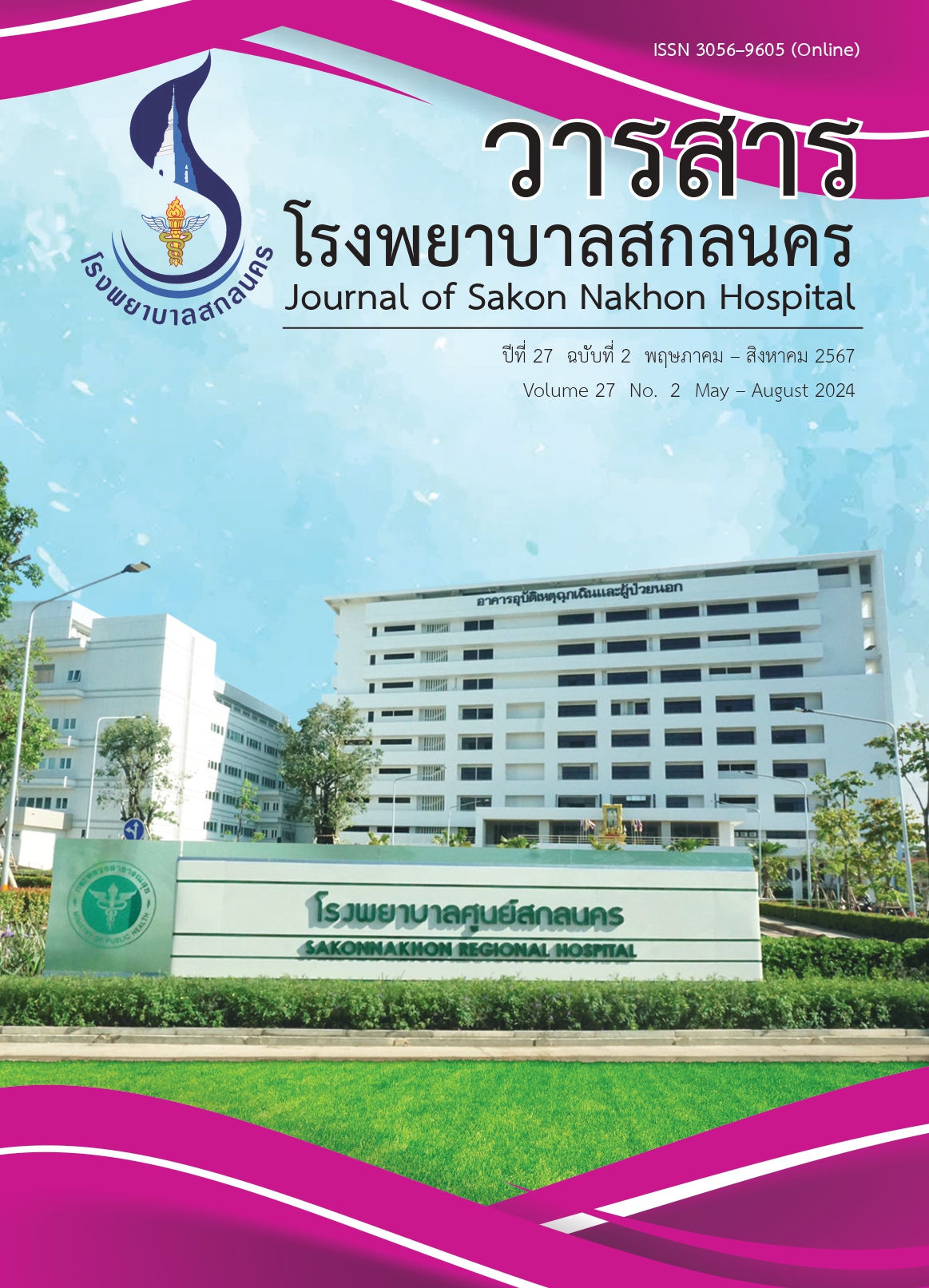Effects of Therapeutic Relationship Program on Depression and Self Esteem among Drug Addicts, Thanyarak Udon Thani Hospital
Keywords:
Therapeutic relationship program, Depression, Self-esteem, Drug addictsAbstract
This quasi-experimental research used two groups pre-post-test design was to study the outcomes of therapeutic relationship program on depression and self- esteem in drug addict patients. The samples were 40 drug addict patients who admitted at the rehabilitation ward. The samples were assigned into an experimental group and control group (20 participants in each group). The experimental group attended the researcher, s group counselling based on therapeutic relationship program twice a week, 60-90 minutes each time, totally 6 sessions. The tools used for data collection were 1) Depression Assessment Question 9 Thai version (Patient Health Questionnaire-9: PHQ-9) 2) Rosenberg Self-esteem Scale (RSES) and 3) Therapeutic relationship program. Data were analyzed with the descriptive statistics, and inferential statistics; paired t- test and independent t-test.
The results revealed that 1) the experimental groups showed lower level of depression after participating therapeutic relationship program 2) the average self-esteem score of experimental groups after participating therapeutic relationship program (Mean = 29.70, S.D. = 2.32) was significantly higher than that before participating (Mean = 12.35, S.D. = 1.87) (p < 0.05). and 3) The average self-esteem score in experimental group (Mean = 29.70, S.D. = 2.32) was significantly higher than that of control group (Mean = 16.85, S.D. = 1.57) (p < 0.05).
Conclusion: The therapeutic relationship program positively impacted depression and self- esteem among drug addicts. However, long term monitoring for the effectiveness stability should be done in the future.
References
เอกอุมา อิ้มคำ. การพยาบาลสุขภาพจิตและจิตเวช: การประยุกต์ใช้กรณีเลือกสรร. พิมพ์ครั้งที่ 3. กรุงเทพ: โรงพิมพ์มหาวิทยาลัยธรรมศาสตร์; 2564.
ธิดารัตน์ ห้วยทราย, และวิจิตร แผ่นทอง. การศึกษาความคิดอัตโนมัติด้านลบและภาวะซึมเศร้าในผู้ป่วยยาเสพติด. ว. วิจัยและพัฒนาระบบสุขภาพ 2563;13(3):297-304.
ภูฟ้า เอ็นเตอร์ไพรส์. โรคเเทรกซ้อนที่เกิดจากการติดยาเสพติด มีอะไรบ้าง ป้องกันอย่างไร? [อินเทอร์เน็ต]. กุมภาพันธ์ 2567. [เข้าถึงเมื่อ 20 สิงหาคม 2567]. เข้าถึงได้จาก: https://www.phufaresthome.com/blog/drugs-addict-complications/
Beck AT. Depression Clinic experimental and theoretical aspects. In: Aaron Beck, editors. Depression: Causes and. New York: Hebert Medical; 1970. p. 44-59.
Beck AT. Structure of the therapeutic interview. In: Aron T. Beck A. Rush J, Brain F. Shaw, and Emery G, editors. Cognitive therapy of depression. New York: Guilford Press; 1979. p. 61-86.
ธนาธิป หอมหวน, มรรยาท รุจิวิชชญ์, และชมชื่น สมประเสริฐ . การเสริมสร้างความรู้สึกมีคุณค่าในตนเองของผู้ป่วยวัยรุ่นเสพติดแอมเฟตามีน. ว. การพยาบาลจิตเวชและสุขภาพจิต 2557;28(1):81-91.
อัจรา ฐิตวัฒนกุล, สารรัตน์ วุฒิอาภา, และชมชื่น สมประเสริฐ. ผลของโปรแกรมสัมพันธภาพเพื่อการบำบัดต่อความรู้สึกมีคุณค่าในตนเองของเด็กหญิงที่ถูกกระทำรุนแรง ในสถานแรกรับเด็กหญิง เขตภาคกลาง. ว. การพยาบาลจิตเวชและสุขภาพจิต 2560;31(2):47-63.
ดุษณีย์ ชาญปรีชา, นันทา ชัยพิชิตพันธ์, สุกุมา แสงเดือนฉาย และสำเนา นิลบรรพ. ผลของโปรแกรมการบำบัดความคิดและพฤติกรรมต่อภาวะซึมเศร้าในผู้ป่วยเมทแอมเฟตามีน. ว. กรมการแพทย์ 2560;42(2):90-101.
Yalom I. The Theory and Practice of Group Psychotherapy. In: The Therapeutic Factors, editors. An Integration. 2nd ed. New York: Basic Books; 1975. p. 103-152.
Sitthimongkol Y, Kaesornsamut, P, Vongsirimas N, & Pornchaikate Au Yeong A. Psychiatric Nursing. Bangkok: Scanart; 2018.
กรมสุขภาพจิต. คู่มือโปรแกรมบูรณาการการบำบัดฟื้นฟูสมรรถภาพผู้ป่วยจิตเวชสุรา/ยา/สารเสพติด ที่มีโรคร่วมทางจิตเวช (ICOD-R) ฉบับปรับปรุง. กรุงเทพฯ. น่าดู มีเดีย พลัส; 2564.
Peplau HE. Phases and Roles in Nursing. In: Hildegard E. International relations in nursing, editors. A conceptual frame of reference for psychodynamic nursing. New York: Springer; 1952. p. 17-72.
ศิริลักษณ์ ปัญญา, เพ็ญนภา แดงด้อมยุทธ์, และพีรพนธ์ ลือบุญธวัชชัย. ผลของกลุ่มจิตบำบัดสัมพันธภาพระหว่างบุคคลต่อภาวะซึมเศร้าในผู้ป่วยโรคซึมเศร้า. ว. สมาคมจิตแพทย์แห่งประเทศไทย 2558;60(2):99-110.
ปริทรรศ ศิลปกิจ, และอรวรรณ ศิลปกิจ. คุณสมบัติทางจิตมิติของแบบวัดความภาคภูมิใจในตนเองของ Rosenberg ในเยาวชนไทย. ว. สุขภาพจิตแห่งประเทศไทย 2559;24(1):15-28.
Finkelhor D. A sourcebook on childhood sexual abuse. Thousand Oak: Sage;1986.
Rosenberg M. Society and the Adolescent Self-Image. Middletown, USA: Princeton University Press; 1965.
ปรียนันท์ สละสวัสดิ์, และอัจฉราพร สี่หิรัญวงศ์. การพัฒนาโปรแกรมส่งเสริมความรู้สึกมีคุณค่าในตนเองและลดอาการซึมเศร้าสำหรับผู้ป่วยโรคจิตเภท. ว. การพยาบาลจิตเวชและสุขภาพจิต 2563;34(1):13-42.
Downloads
Published
How to Cite
Issue
Section
License
บทความที่ตีพิมพ์ถือว่าเป็นลิขสิทธิ์ของวารสารโรงพยาบาลสกลนคร การคัดลอกเพื่อพัฒนาเชิงวิชาการต้องได้รับการอ้างอิงอย่างถูกต้อง






